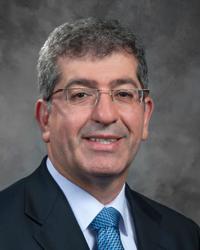Loading Complete

George Jallo, MD
Neurosurgery
Accepting New Patients
55 Insurances Accepted
View allAbout
Professional Titles
Primary Academic Title
Background
Leadership Title
Videos
Recent News Articles and Media Coverage
Additional Academic Titles
Research Interests
Research Summary
Google Scholar
PubMed
Selected Publications
Locations
- Johns Hopkins All Children's Outpatient Care, St. Petersburg
- 601 5th Street South, Suite 500, Saint Petersburg, FL 33701
- phone: 727-767-8181
- fax: 727-767-8030
Expertise
Education
Beth Israel Medical Center - North Division
Fellowship, Pediatric Neurosurgery, 1999New York University Medical Center
Residency, Surgery, 1998University of Virginia School of Medicine
Medical Education, MD, 1991Board Certifications
Pediatric Neurological Surgery
American Board of Pediatric Neurological Surgery, 2004Neurological Surgery
American Board of Neurological Surgery, 2002Insurance
Johns Hopkins providers participate in many commercial health insurance plans. To confirm coverage of your specific physician or provider, please contact your insurer directly. For more details, please review our Insurance Information.
Search plans
- Aetna
- Aetna (Commercial)
- Aetna Better Health (Medicaid)
- Amerigroup District of Columbia
- AmeriHealth Caritas District of Columbia
- Avmed (Commercial)
- BCBS FL (Commercial)
- Beech Street
- Blue Cross Blue Shield Federal Employee Program (FEP)
- CareFirst
- Cigna
- Cigna Health Care (Commercial)
- Coventry (Commercial)
- Evernorth Behavioral Health
- Evolutions (Commercial)
- First Health
- Florida Medicaid
- Geisinger Health Plan
- Gulf Coast Provider Network (Commercial)
- HealthSmart/Accel
- Humana
- Humana Commercial
- Humana Medicaid
- JAI Medical Systems
- Johns Hopkins Health Plans
- Kaiser Permanente
- KeyCare
- Magellan Complete Care (Medicaid)
- Maryland Physicians Care
- Medicaid Maryland
- Medicare
- Medicare DC
- Medicare Maryland
- MedStar Family Choice District of Columbia
- Molina/ Magellan (Medicaid)
- MultiPlan
- Multiplan (Commercial)
- Pennsylvania's Preferred Health Networks (PPHN)
- Point Comfort Underwriters
- Private Healthcare Systems (PHCS)
- Provider Partners Advantage HMO SNP Medicare Advantage
- Simply Healthcare (Medicaid&Healthy Kids)
- South Central Preferred (SCP)
- Sunshine State/ Wellcare (Medicaid &Healthy Kids)
- Superior Vision
- TriCare
- TRICARE (Humana Military East)
- United (Commercial)
- United Community Plan (Medicaid&HealthyKids)
- UnitedHealthcare
- Veteran Affairs Community Care Network (Optum-VACCN)
- Vivida Health
- Wellcare (Medicaid&Healthy Kids&CMS)
- Wellpoint (Amerigroup MD)
- WPS TriCare East (Commercial)
